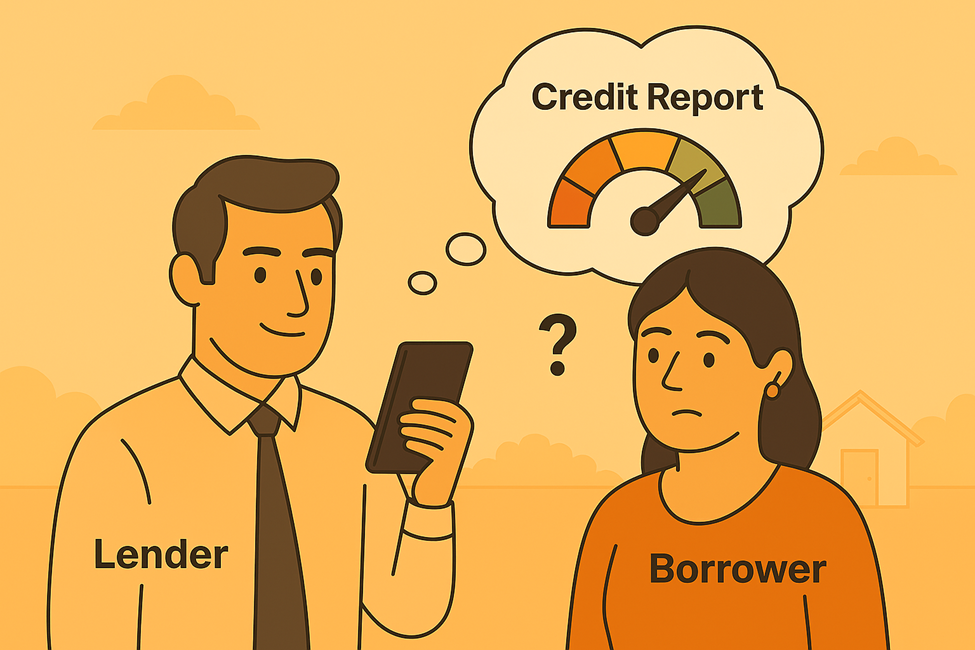Why All Lenders Rely on Credit Bureaus Before Approving Your Loan


Anita worked in marketing and believed that her regular income alone would secure her a loan. But when she applied, the lender first looked at her credit report, not her income. That report, based on years of repayments, showed how she managed money.
In this blog, you will learn why lenders check credit bureaus, how your credit score affects approval, and simple ways to keep your record strong.
What Are Credit Bureaus
Credit bureaus work quietly in the background, tracking how you use credit and whether you pay on time. India has four RBI-recognized credit bureaus: CIBIL, Equifax, Experian, and CRIF High Mark.
These agencies collect details from banks and NBFCs and update your record regularly. Every time you take a loan, use a credit card, or make a repayment, the information is shared with them. They use this data to build your credit report and update your credit score, which usually falls on a credit score scale of 300 to 900.
Think of it this way: just like you’d check reviews before buying something, lenders check your credit bureau report before lending.
Also Read: Experian Vs CIBIL: What are the Definition, Meaning & Differences?
What Information Does the Bureau Share With Lenders?
When lenders look at your credit report, it brings together several pieces of information that tell them how you manage money day to day.
● Credit Score - This is a three-digit number, anywhere from 300 to 900. The closer you are to 900, the safer you may appear as a borrower.
● Repayment History - Shows whether you’ve paid EMIs and bills on time or if there have been late or missed payments. A clean record makes approval simpler.
● Loans and Cards in Use - Lists your active borrowings. Having too many at once can signal you’re stretched.
● Outstanding Amounts - Adds up what you still owe. Large unpaid balances can make a lender more cautious.
● Credit Use - Known as the utilisation ratio, it tracks how much of your credit limit you spend. Relying heavily on available credit can be seen as a risk.
Together, these details give lenders a clear view of your borrowing habits. If your report shows steady repayments and sensible use of credit, your loan process is usually quicker and easier.
Why Lenders Depend on Credit Bureaus
Every loan involves some risk for the lender. A credit bureau provides neutral information that helps them decide fairly and responsibly.
Here are the main reasons lenders rely on them -
● Checking Repayment History - Past behaviour gives clues about future repayment patterns
● Fair Comparison - Credit scores give a standard way to assess different applicants’ repayment behaviour and overall creditworthiness
● Responsible Lending - Reports help lenders determine a suitable loan amount for you, so repayments stay manageable and do not create financial pressure.
Also Read: Why Do Credit Scores Vary Across Credit Bureaus?
How Your Credit Report Affects Loan Terms
Your credit history does not just decide if a loan is approved. It can also affect -
● Loan Amount - A stronger credit record may allow a higher approved amount
● Interest Rate - Good repayment history can sometimes lead to more favourable terms
● Processing Time - Clear records often reduce the need for extra checks
Want to know where you stand? Try Hero FinCorp’s loan eligibility calculator to check the amount you may qualify for in just a few clicks.
Take Charge of Your Credit Journey
For lenders, credit bureaus show how you’ve handled repayments. For you, they’re a way to build trust. By paying bills on time and keeping your card use under control, your score improves over time, making it easier to borrow when needed.
Ready to begin? Skip the hassle and apply for Hero FinCorp's personal loan online and enjoy a 100% paperless, quick approval process.
Frequently Asked Questions
1. Do all lenders check credit reports?
Yes, whenever you apply for a loan, banks and NBFCs usually begin by running a credit check.
2. Will checking my own score lower it?
No. When you check your own score, it is a soft enquiry and does not reduce your credit score.
3. How often should I check my score?
Doing a credit score check once or twice a year is a good habit. It helps identify errors and keeps you updated on your profile.
4. Is credit score the only thing lenders see?
No. It’s not just about your score. Lenders will also check your income, how stable your employment is, and the other payments you already manage.
Disclaimer: The information provided in this blog post is intended for informational purposes only. The content is based on research and opinions available at the time of writing. While we strive to ensure accuracy, we do not claim to be exhaustive or definitive. Readers are advised to independently verify any details mentioned here, such as specifications, features, and availability, before making any decisions. Hero FinCorp does not take responsibility for any discrepancies, inaccuracies, or changes that may occur after the publication of this blog. The choice to rely on the information presented Here is at the reader's discretion, and we recommend consulting official sources and experts for the most up-to-date and accurate information about the featured products.